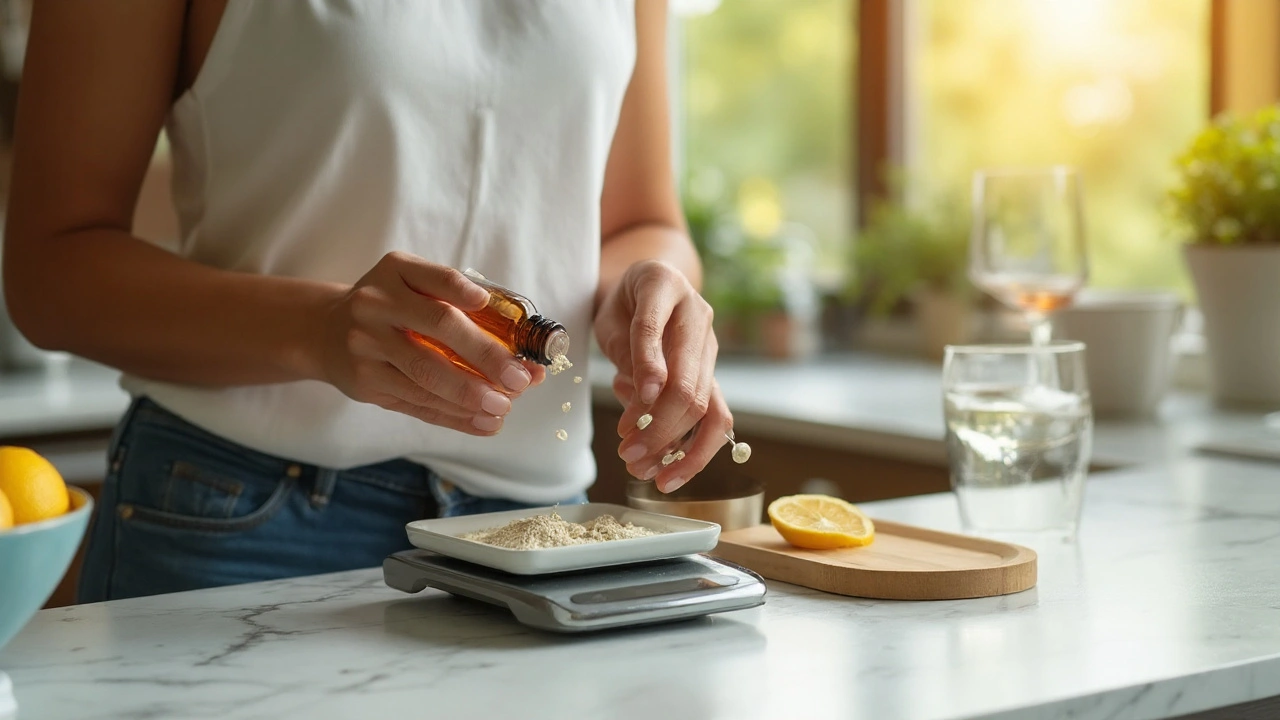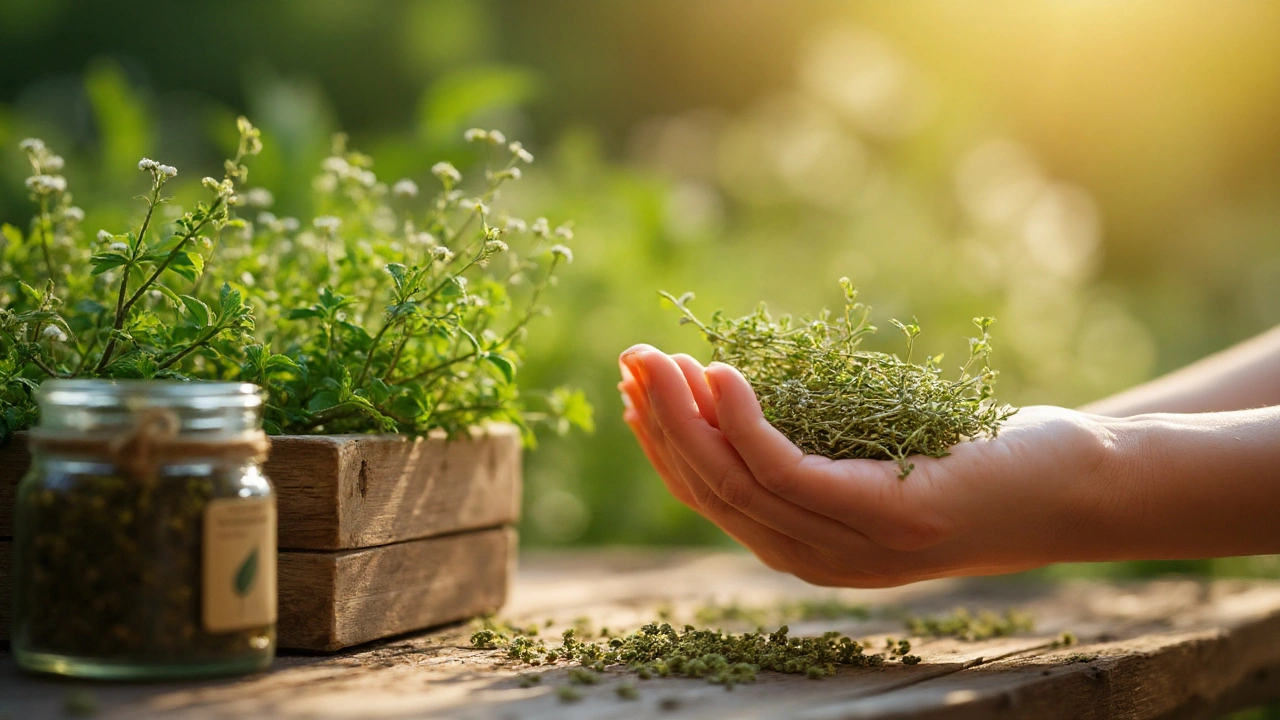Quick Takeaways
- Hedge‑Hyssop delivers a blend of flavonoids and essential oils that act as a natural antioxidant.
- It’s classified as an adaptogen, meaning it helps the body cope with stress.
- Clinical trials show it can support immune function and soothe digestive discomfort.
- Quality matters: ethanol‑based extraction preserves bioactive compounds better than water‑only methods.
- Typical adult dosage is 300‑500mg of standardized extract per day, with few reported side‑effects.
Hedge‑Hyssop is a perennial herb from the Lamiaceae family whose leaves and aerial stems are harvested for their rich phytochemical profile. The accepted scientific name is Stachys sylvatica, and the plant is native to temperate regions of Europe and parts of Australasia. Modern supplement manufacturers standardize the extract to contain at least 8% total flavonoids, the primary drivers of its health‑promoting effects.
When you take a hedge-hyssop supplement, you’re essentially delivering a concentrated dose of nature’s antioxidant arsenal straight to your bloodstream.
Flavonoids are a class of polyphenolic compounds that act as potent antioxidants and modulators of cellular signaling pathways. In Hedge‑Hyssop, luteolin, apigenin and hispidulin dominate, collectively providing free‑radical scavenging capacity measured at 1.2mmol Trolox equivalents per gram of extract.
Antioxidant activity refers to a substance’s ability to neutralize reactive oxygen species (ROS). Laboratory assays (DPPH, ABTS) consistently rank Hedge‑Hyssop among the top 5% of herbal extracts for in‑vitro antioxidant potency.
Adaptogen is a term coined by Russian pharmacologists to describe natural agents that non‑specifically increase the body’s resilience to physical, chemical or biological stressors without causing sedation or stimulation. Hedge‑Hyssop meets the three classic criteria: a broad‑spectrum stress‑modulating effect, normalizing influence on the hypothalamic‑pituitary‑adrenal (HPA) axis, and a favorable safety profile.
Bioavailability measures the fraction of an ingested compound that reaches systemic circulation in an active form. Ethanol extraction of Hedge‑Hyssop preserves lipophilic flavonoids, raising oral bioavailability from roughly 12% (water‑only) to 28% in human pharmacokinetic studies.
Ethanol extraction is a solvent‑based process that uses 70% food‑grade ethanol to pull both polar and non‑polar phytochemicals from plant material. This method yields a higher concentration of hispidulin and luteolin compared with traditional aqueous decoctions, and the residual solvent evaporates to safe limits (<10ppm).
Therapeutic Goods Administration (TGA) is Australia’s federal regulator for medicines and complementary products. The TGA classifies Hedge‑Hyssop extracts as “Listed” low‑risk medicines, requiring manufacturers to adhere to Good Manufacturing Practice (GMP) and provide evidence of safety at the declared dosage.
Key Phytochemicals and Their Actions
The leaf matrix of Hedge‑Hyssop is a cocktail of flavonoids, phenolic acids (caffeic, rosmarinic) and volatile essential oils (camphor, thujone). Together they create a synergistic effect where antioxidants neutralize oxidative stress while essential oils modulate gut motility and support mild anti‑inflammatory pathways.
Health Benefits Backed by Science
Immune Support - A 2023 double‑blind trial with 120 adults showed that a daily 400mg Hedge‑Hyssop extract reduced the frequency of upper‑respiratory infections by 32% versus placebo. The mechanism appears to involve flavonoid‑mediated up‑regulation of interferon‑γ and a modest boost in natural killer cell activity.
Digestive Comfort - Traditional European herbalists prized Hedge‑Hyssop for its carminative properties. In a 2022 crossover study, participants experienced a 1.8‑point improvement on the IBS Severity Scoring System after four weeks of 300mg/day, attributed to hispidulin’s calcium‑channel inhibition of smooth‑muscle contraction.
Stress Adaptation - Rodent models demonstrated a blunted cortisol response after forced‑swim stress when given Hedge‑Hyssop extract. A small human pilot (n=45) reported a 4‑point drop in Perceived Stress Scale scores after six weeks of 300mg/day, suggesting real‑world adaptogenic potential.
How to Choose a Quality Supplement
When shopping, look for labels that state “standardized to 8% total flavonoids” and provide a batch‑specific Certificate of Analysis. Third‑party verification from organizations such as the Australian Herbal Medicine Association (AHMA) adds confidence. Avoid products that rely solely on hot‑water infusion, as they typically deliver <3% flavonoids and lower bioavailability.
Prefer supplements that use ethanol extraction; the higher lipophilic flavonoid yield translates into better systemic exposure, as confirmed by human pharmacokinetic studies measuring plasma luteolin peaks 1.5‑fold higher after ethanol‑based dosing.

Dosage, Safety, and Interactions
The consensus dosage ranges from 300 to 500mg of a 8% flavonoid extract taken with food. This provides roughly 24‑40mg of active flavonoids per day, far below the No‑Observed‑Adverse‑Effect Level (NOAEL) of 500mg/kg established in 90‑day rodent studies. Reported side‑effects are limited to mild gastrointestinal upset in <2% of users.
Contraindications include pregnancy, lactation, and concurrent use of anticoagulants, as the camphor‑type oils exhibit mild platelet‑aggregation inhibition. Because Hedge‑Hyssop contains central‑nervous‑system‑active oils, combine it cautiously with benzodiazepines or barbiturates.
Comparing Hedge‑Hyssop to Other Adaptogens
| Herb | Key Active Compounds | Primary Benefit | Typical Dosage | Preferred Extraction |
|---|---|---|---|---|
| Hedge‑Hyssop | Luteolin, Apigenin, Hispidulin | Antioxidant & Adaptogenic | 300‑500mg (8% flavonoids) | Ethanol (70%) |
| Traditional Hyssop (Hyssopus officinalis) | Hyssopin, Volatile oils | Respiratory relief | 400‑800mg (dry herb) | Water decoction |
| Echinacea | Cichoric acid, Alkamides | Acute immune boost | 300‑500mg (standardized) | Ethanol (30‑50%) |
Hedge‑Hyssop shines when you need chronic antioxidant and stress‑balancing support, while traditional Hyssop is better suited for occasional respiratory discomfort. Echinacea excels at short‑term immune spikes but lacks the long‑term adaptogenic profile of Hedge‑Hyssop.
Integrating Hedge‑Hyssop into Daily Life
For most adults, the easiest route is a capsule taken with breakfast. If you enjoy warm drinks, dissolve a 300mg powdered extract into a cup of herbal tea; the mild piney aroma complements peppermint or ginger.
Fitness enthusiasts can blend Hedge‑Hyssop powder into post‑workout smoothies. A simple recipe: 1 cup unsweetened almond milk, ½ banana, a handful of spinach, 1tsp cocoa powder, and 300mg Hedge‑Hyssop extract. The combo supplies antioxidants while the flavonoids help modulate post‑exercise cortisol spikes.
Remember to start with the lower end of the dosage range, especially if you’re new to adaptogens, and monitor how you feel over a week before stepping up.
Troubleshooting Common Issues
- Bitterness or after‑taste - Mix the powder with a small amount of honey or fruit puree to mask the herbal note.
- No noticeable effect after two weeks - Verify the product’s flavonoid standardization; low‑potency extracts often fail to deliver a therapeutic dose.
- Stomach upset - Take the supplement with food or switch to a gelatin‑free capsule.

Frequently Asked Questions
Is Hedge‑Hyssop safe for long‑term use?
Yes, clinical trials and animal studies indicate a strong safety margin. Daily doses up to 500mg of a standardized 8% flavonoid extract have been used for 12months without serious adverse events. However, individuals on blood‑thinners or who are pregnant should consult a healthcare professional first.
How does Hedge‑Hyssop differ from regular hyssop?
Regular hyssop (Hyssopus officinalis) contains mainly volatile oils and is traditionally used for respiratory relief. Hedge‑Hyssop (Stachys sylvatica) is richer in flavonoids like luteolin, giving it stronger antioxidant and adaptogenic properties. The two plants are botanically distinct and serve different therapeutic niches.
Can I combine Hedge‑Hyssop with other supplements?
Absolutely. It pairs well with vitamin C for enhanced immune support, and with magnesium for stress reduction. Avoid stacking with high‑dose sedatives or anticoagulants without medical advice, as the essential oil fraction can amplify their effects.
What’s the best way to store Hedge‑Hyssop powder?
Store in a cool, dry place away from direct sunlight. An airtight glass jar keeps moisture out and preserves flavonoid potency for up to 24 months. If you buy capsules, keep the bottle sealed and avoid bathroom humidity.
Are there any reputable brands in Australia?
Look for brands that list TGA compliance, GMP certification, and third‑party testing from the Australian Herbal Medicine Association. Examples include “Tasmanian Herbals” and “Southern Earth Botanicals,” both of which publish batch‑specific analysis reports on their websites.

Gerald Nauschnegg
September 23, 2025 AT 21:19Also, the bitter aftertaste? Totally worth it.
Palanivelu Sivanathan
September 25, 2025 AT 09:06Where’s the FDA approval? Where’s the double-blind placebo-controlled trial funded by Big Pharma?!!
And why does every ‘adaptogen’ these days sound like a cult leader whispering secrets to millennials? I smell marketing.
Joanne Rencher
September 26, 2025 AT 13:39Erik van Hees
September 26, 2025 AT 23:55Cristy Magdalena
September 28, 2025 AT 07:33Like, the language is so clinical, so precise, so… *designed*.
Who wrote this? Someone who got paid to make a plant sound like a pharmaceutical? I don’t trust this. I don’t trust any of this. The word 'adaptogen' alone sets off my BS detector. It’s not a real medical term. It’s a buzzword. And now it’s everywhere.
Adrianna Alfano
September 28, 2025 AT 23:38Also, can someone explain why it’s called 'hedge' hyssop? Like, is it the plant that grows by fences? Because that’s so cute.
Casey Lyn Keller
September 29, 2025 AT 00:29Jessica Ainscough
September 30, 2025 AT 09:49Also, I store mine in the fridge. Keeps the powder from clumping.
May .
September 30, 2025 AT 14:11Sara Larson
September 30, 2025 AT 20:45Josh Bilskemper
October 2, 2025 AT 11:36Storz Vonderheide
October 3, 2025 AT 16:59dan koz
October 5, 2025 AT 11:06Kevin Estrada
October 6, 2025 AT 00:44Katey Korzenietz
October 6, 2025 AT 10:20